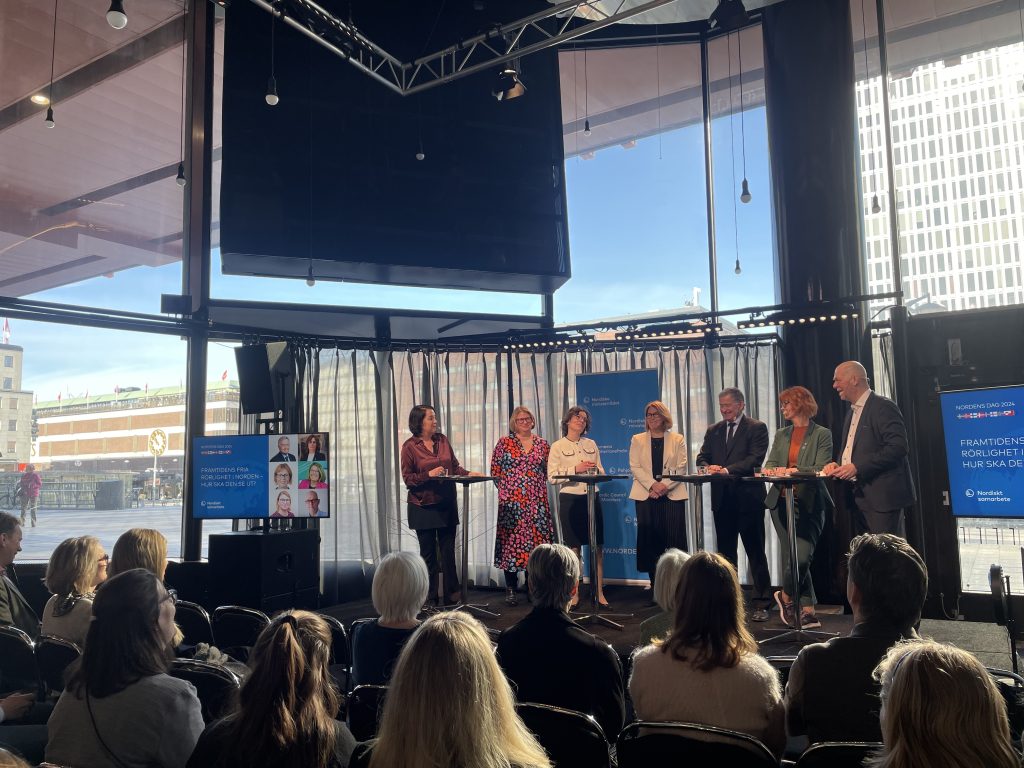Overcoming mobility issues for Nordic citizens and businesses is a key aspect of the work towards becoming the most integrated region by 2030. How do we facilitate freedom of movement in the future? This was the central question at Monday’s event in Stockholm ahead of Nordic Day 23 March.
On 23 March 1962, the Helsinki Treaty was signed between Finland, Norway, Denmark, Iceland and Sweden. Throughout this week, various activities have taken place across the region leading up to what we now refer to as Nordic Day—celebrating the world’s oldest form of regional political co-operation. In Stockholm, the celebration took the form of an event at the Culture House organised by Info Norden, zooming in on cross-border collaboration, mobility barriers and the future of free movement in the Nordics.
Freedom of movement is one of the cornerstones of Nordic co-operation. Already in the decade prior to the Helsinki Treaty, the freedom to move was established with a common Nordic labour market agreement in 1954 and the Nordic Passport Union in 1958, creating mutual wins for the countries and eventually inspiring the Schengen agreement.
Today, overcoming mobility issues for Nordic citizens and businesses is considered central to the shared quest of becoming the most integrated and sustainable region by 2030. Still, there’s a need for strengthened political commitment and prioritisation of Nordic regional issues in times of major global demands.

Status in 2024?
In fact, the elimination of mobility barriers across the region has slowed down, as noted by Sweden’s Minister for Nordic Co-operation Jessica Roswall in her speech during Monday’s event. The Minister highlighted vital measures taken with 85 obstacles solved since the Freedom of Movement Council was established in 2014. She further acknowledged the need for increased focus and continued efforts on streamlining the process for solving these issues.
According to a new Nordregio report, cross-regional perspectives have become less prominent in the national strategies for regional development in Norway and Sweden. The study analysed current and previous strategies, also interviewing stakeholders to explore cross-border challenges and opportunities for collaboration. Report authors Anna Berlina and Alix Vuithier stress the importance of nurturing a strong relationship between Norway and Sweden. They emphasize the need to prioritize the cross-border perspective within the political agendas, as such cooperation not only benefits the border regions but also has a positive impact on larger geographical areas. Increasing capacity for innovation is just one example of the many potential benefits. And in light of Sweden’s accession to NATO, this collaboration becomes even more crucial.
More research and data needed
Anna Berlina further highlights the need for more reliable and comparable statistics that reflect the actual conditions of the border regions. As emphasized by the interviewed study participants: “Good reliable data is key to represent the conditions and barriers facing these regions, and helps them demonstrate the broader socioeconomic benefits of solving them”.
The data matter was also brought up during Monday’s panel discussion by Anders Ahnlid, Chairman of the Freedom of Movement Council, who stressed the need for more statistics and collaborations between the Nordic statistical agencies. Minister Jessica Roswall highlighted Nordregio’s work in this regard, particularily mentioning that the Nordic average on cross-border commuting was lower than she had expected before seeing the data (0.5% compared to the 1% EU average). This points to the value of reliable and comparable numbers as a baseline for improvement.
Roswall continued to emphasise that the 70-year common Nordic labour market in 2024 should be a good opportunity for further discussion on specific competence mobility issues facing the region. Looking ahead, she wants to see more dialogue and collaboration take place between politics, business and bureucracy to leverage untapped potential; “We have incredible opportunities – if we do this right and if we do the work.”

Svensk-norskt samarbete: viktiga utmaningar och framtida möjligheter
Författare: Anna Berlina och Alix Vuithier, Nordregio
Denna rapport, beställd av Region Värmland, analyserar gränshinder inom den statliga regionalpolitiken mellan Sverige och Norge, med målet att belysa integrationen av gränsperspektivet och diskutera utmaningar samt möjligheter för gränsöverskridande samarbete.
Watch the live-stream from the Stockholm Nordic Day event 2024 below.
Read Info Norden’s new publication “Around the Nordic Region in 80 points“.
Info Norden is the oldest and only pan-Nordic information service for residents of the Nordic countries. It provides those wishing to move, work, study or start a business in the Nordic countries with general information to support the Nordic Freedom of Movement.




